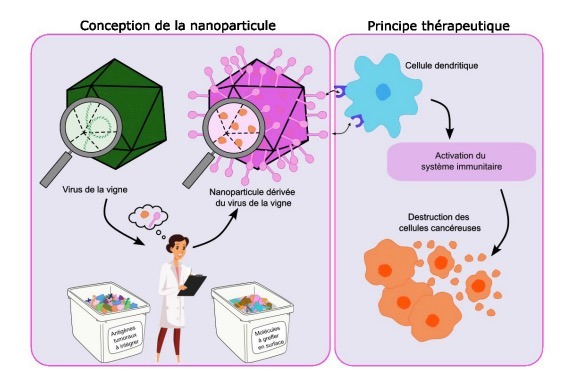Published on
Updated
Reading 2 min.
Doctissimo participated in the Arc Foundation Kerner Prize. This prize distinguishes young researchers for their ability to popularize their research on cancer. The first prize was awarded to Armelle Guingand who is working on a nanoparticle from vines to boost our immunity against cancer.
For several years, immunotherapy has revolutionized the treatment of several cancers, notably through the arrival of immunomodulators capable of thwarting the strategies of cancer cells to escape our immune system. But Armelle Guingand’s research project acts in another way and it has the originality of relying on a virus from the vine!
A vine virus to fight cancer
The grapevine virus used is better known for destroying entire vineyards than cancers. It has the appearance of a solid with 20 faces of 30 nanometers, or 30,000 folds smaller than a millimeter. “To transform it into a therapeutic weapon, I change its composition without changing its shape. I thus manufacture solid nanoparticles which are capable, with their new organization, of activating the immune system” explains our researcher.
To do this, it empties the virus of its genetic material and instead incorporates tumor antigens, fragments of tumors which will provoke an immune response. The virus then serves as a transporter to dendritic cells. “These cells digest the nanoparticles and the tumor antigens they contain. Then, like orchestra conductors, they give the “la” to the other cells of the immune system which activate in concert to destroy the cancer cells.” explains Armelle Guingand, who thus makes a complex process simple.
Choosing the right bricks for the best anti-cancer weapon
But why choose this vine virus? In Midi Libre, also a partner of this prize, she admits that there is also an element of chance: “The Institute of Molecular and Cellular Biology is neighboring the Institute of Medical Biology. A team was working on the grapevine virus, and had numerous molecular tools to develop this research“.

But beyond the combination of circumstances, the virus has proven to have unprecedented stability and ease of use. All that remains is to incorporate the right tumor antigens and the right molecules on its surface. “Like a construction game, by selecting the right bricks, I can precisely adapt its composition to each cancer to give the conductor the right score to play to destroy the cancer” specifies the expert.
No human trials before 10 years…
The objective is not to have the absolute weapon against cancer but to have an additional weapon, combined with other treatments already proven. Tested in mice, this strategy made it possible to activate the rodent’s immune system and slow down the development of tumors. The next step is to evaluate its toxicity again in animals before testing the principle on human cells, then if all these obstacles are overcome, consider trials on humans. Not for around ten years a priori.
On October 12 and 13, 27th Young Cancer Researchers Days of the ARC Foundation allowed us to highlight future research talents, whose work brings hope for defeating cancer. On this occasion, 11 promising young scientists were awarded the ARC Foundation Young Talent Prizes for scientific communication, the Kerner Prizes for popular science and the Donors’ Favorite Prize. Awards that highlight the excellence of their work and establish the future of cancer research.
